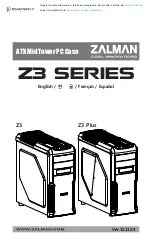
3
3-8
EMC Disk-Array Processor Enclosure (DPE) Deskside Model FC4400/4500 Hardware Reference
Servicing and Upgrading a Deskside DPE
Handling CRUs
This section describes the precautions that you must take, and the
general procedures you must follow when removing, installing, and
storing CRUs.
Power Issues and
CRUs
The deskside DPE is designed to be powered up at all times and to be
hot repairable. Its front door should be closed and each compartment
should contain a CRU or filler panel to ensure EMI compliance and
proper air flow over the CRUs.
While the DPE is powered up, you can service or replace any CRU,
although removing an active LCC or SP will affect operating system
access to the LUNs it controls. Do not remove a faulty CRU until you
have a replacement available.
You can remove the SP fan pack while the DPE is powered up. If the fan pack
is removed for more than about two minutes, the SPs and disk modules
power down. The disk modules and SPs power up again when you reinstall
the SP fan pack.
If the DPE drive fan pack is removed for more than two minutes, the disk
modules and the SPs power down. The disk modules and the SPs power up
again when you reinstall the drive fan pack.
If the DAE drive fan pack is removed for more than two minutes, the disk
modules power down while the Fibre Channel interconnect system continues
operating. The disk modules power up again when you reinstall the drive fan
pack.
Avoiding
Electrostatic
Discharge (ESD)
Damage
When you replace or install CRUs, you can inadvertently damage the
sensitive electronic circuits in the equipment by simply touching
them. Electrostatic charge that has accumulated on your body
discharges through the circuits. If the air in the work area is very dry,
running a humidifier in the work area will help decrease the risk of
ESD damage. You must read and understand the procedures below to
prevent damage to the equipment.
Read and understand the following instructions.
















































